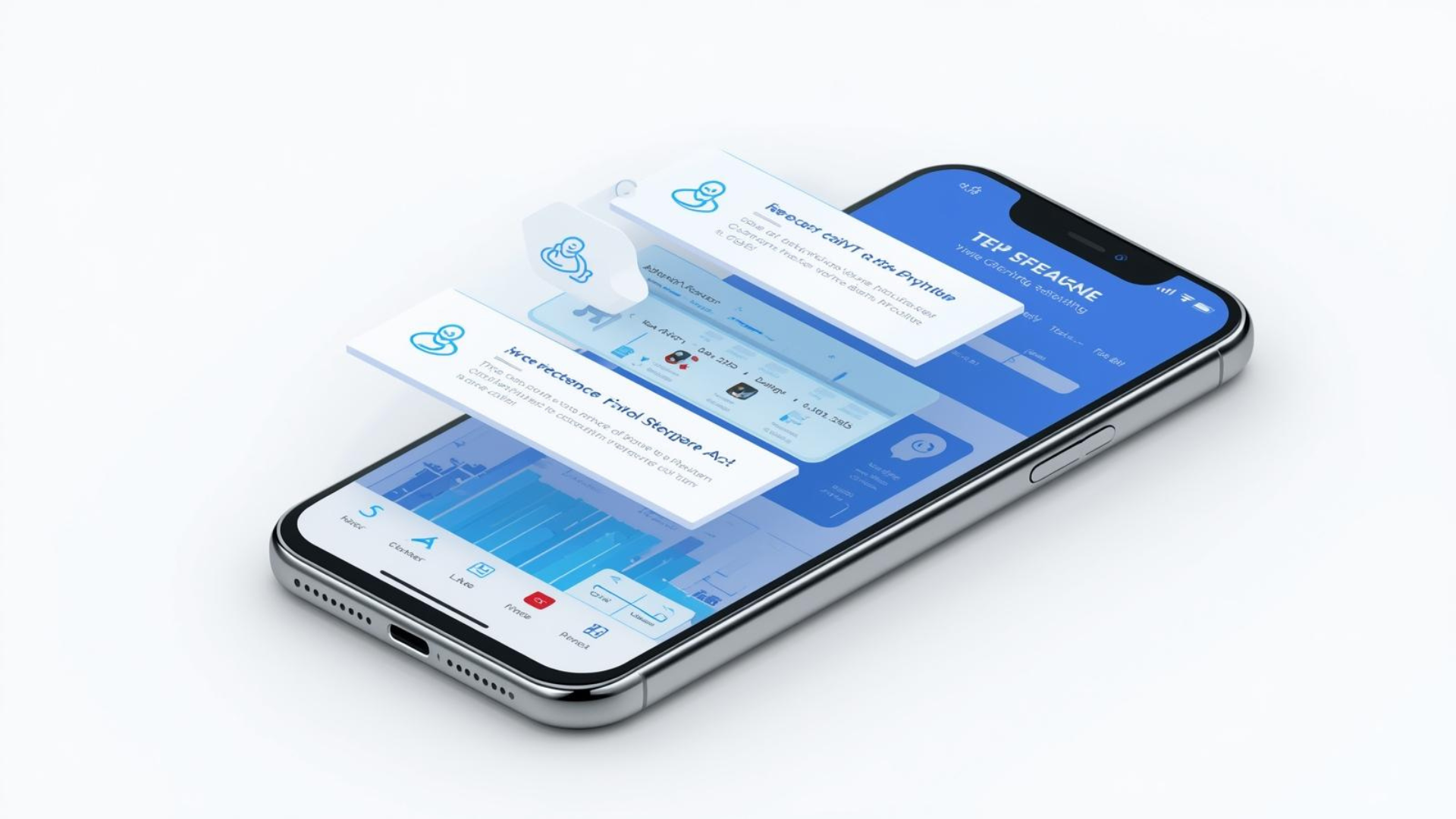Must-Have Features of HVAC Business Software
Running an HVAC business today is a lot more complex than it used to be. If you’re still juggling schedules with notes and multiple apps, you know how stressful things can get.
That’s why having the correct HVAC business software is no longer just a nice bonus; it’s essential. With the right tools, you can save hours every week, boost customer satisfaction, and keep your team on track.
Picture fewer headaches, happier customers, and your team smiling at the end of the day. The right software doesn’t just help, it transforms the whole experience.
Curious about what sets great HVAC software apart? Here’s what you need to know next.
7 Must-Have Features to Look for in HVAC Business Software
Managing an HVAC business in 2025 isn’t what it used to be. Gone are the days when a couple of spreadsheets, a whiteboard, and a trusty notepad could get you through the workweek.
The expectations for speed, accuracy, and professionalism are sky-high. Whether you’re running a lean residential HVAC business or juggling multiple commercial clients and locations, the right HVAC business software can truly make or break your daily operations.
In this guide, we'll walk you through exactly what to look for. We’ll cover the essential features, dig into practical tips, and help you spot the difference between “nice-to-have” and “can’t-live-without” when it comes to HVAC software.
So, whether you’re scaling up, hoping to boost customer satisfaction, or just ready to do business better, grab a coffee and read on.
Key Takeaways
- Selecting the right HVAC business software has a profound impact on efficiency, profitability, and customer satisfaction.
- Modern HVAC software solutions eliminate headaches around job scheduling, customer management, and field service operations.
- The best HVAC software will support growth, streamline data entry, and keep your technicians and customers happy.
- Product demos and free trial periods are your best friends before making any final decisions.
Why HVAC Business Software Is No Longer Optional in 2025
The HVAC industry is moving at a rapid pace. Customers demand faster service, instant updates on job progress, and the option to manage their own HVAC service experience online.
If you’re still relying on pen-and-paper systems or outdated management software, you’re losing money and new customers on the table.
Think about this: Service calls are coming in from multiple locations. You’ve got a team of HVAC technicians out in the field, some working residential jobs, others tackling construction jobs or commercial clients.
With so many moving parts, operational efficiency becomes critical.
Challenges Modern HVAC Businesses Face
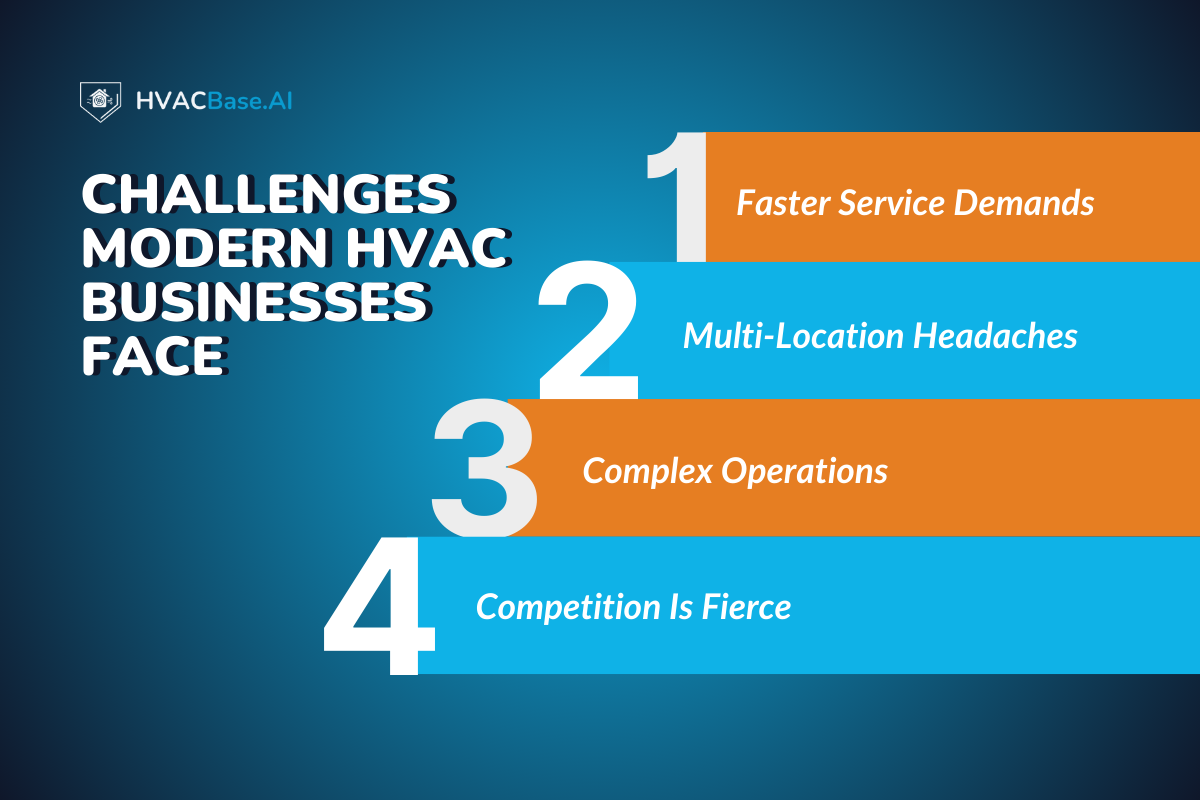
1. Faster Service Demands
Customers expect shorter service windows. Without a reliable scheduling and dispatch system, meeting these expectations can quickly turn into chaos, especially
during peak seasons.
2. Multi-Location Headaches
As your HVAC company grows, managing jobs, inventory, and teams across multiple job sites can feel nearly impossible without robust HVAC field service software.
3. Complex Operations
Running an HVAC business today means wearing multiple hats- managing fleets, tracking finances, handling service agreements, ensuring compliance, and more. Juggling all of this manually drains time and leads to costly mistakes.
4. Competition Is Fierce
Competition is tougher than ever. Therefore, tech-driven HVAC companies are using smarter tools to automate processes, win more bids, and retain loyal customers, leaving slower adopters struggling to keep up.
What Great HVAC Software Solves
Choosing the best HVAC business software isn’t about fancy features. It’s about fixing your everyday issues, which are wasting hours on manual data entry,
double-booking jobs, losing track of customer information, incurring high fuel costs from poor routing, and managing complicated payment processes.
By investing in dedicated HVAC software solutions, business owners and managers set their entire business up for growth and exceptional service.
HVAC Software Market Size was estimated at 4,640 (USD Billion) in 2024. The HVAC Software Market Industry is expected to grow from 5.06 (USD Billion) in 2025 to 12 (USD Billion) by 2035.
The Ultimate HVAC Software Feature Checklist
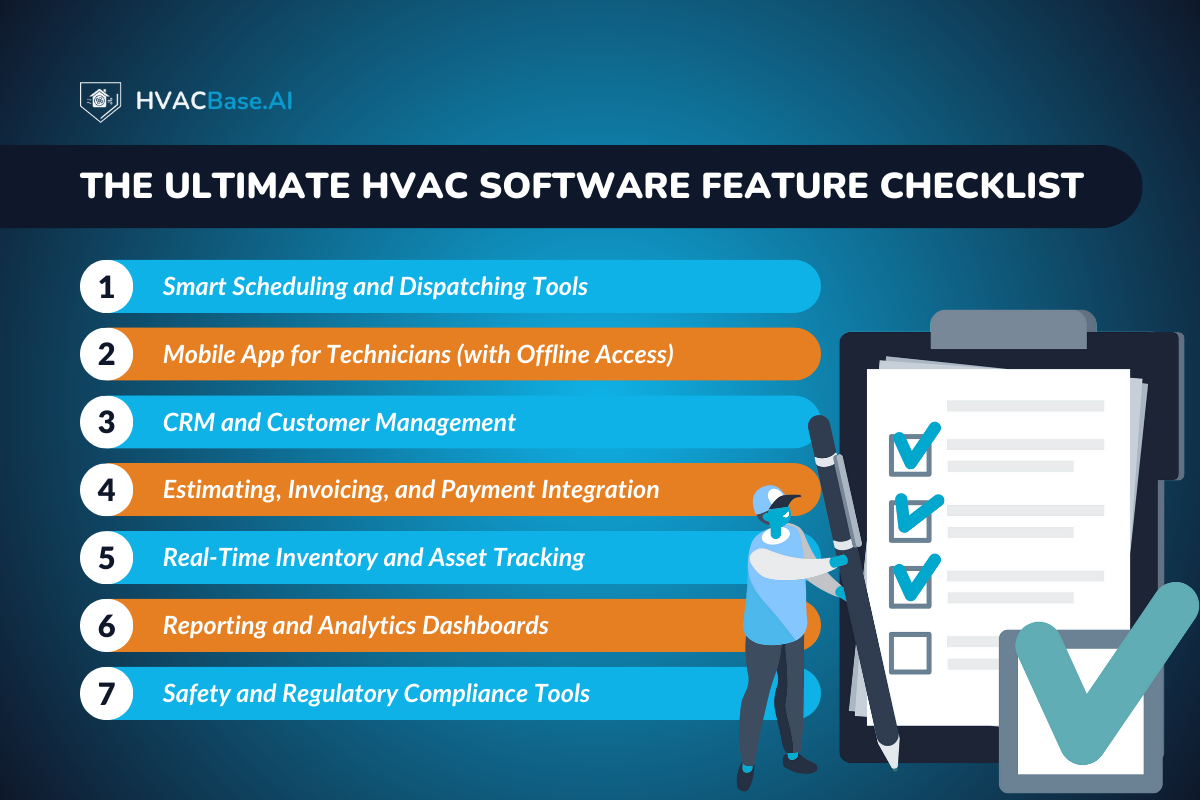
Cut to the chase. If you want your business to operate smoothly and stay ahead of the competition, these are the seven features you can’t ignore.
1. Smart Scheduling and Dispatching Tools
Picture this: It’s Monday morning, and you’ve got technicians dotted across the city, each with a full slate of jobs. Without reliable HVAC scheduling and HVAC dispatch software, chaos is just a phone call away.
What It Is:
Look for advanced scheduling that’s either AI-powered or gives you strong rule-based tools. This software assigns the right tech to the right job based on location, skill set, and workload.
Major upgrade: route optimization that factors in GPS tracking to get your techs to job sites faster while reducing fuel costs.
Why It Matters:
Clever scheduling means fewer double bookings, reduced overtime, and techs spending less time driving all over town.
Imagine sending your HVAC technicians on a perfectly optimized route: not only are your team members happier, but customers are too, because they receive tighter service windows.
Bonus:
If your business handles emergency calls or promises same-day service, then software that allows last-minute changes and instantly reassigns jobs is priceless.
2. Mobile App for Technicians (with Offline Access)
Most of your field work happens miles from the office, sometimes even in locations with spotty service.
What It Is:
A reliable HVAC mobile app that lets techs access schedules, check job details, upload photos, and log time even if they’re out of range.
When they reconnect, everything automatically syncs with your main system.
Why It Matters:
No more waiting to get back to the office to update service history or upload notes. Techs are empowered to handle tasks on the go, which means less paperwork and more time spent on real work.
Bonus:
Mobile apps with customer signature capture, van stock visibility, and digital checklists make it easy for your team to deliver exceptional service every single visit.
3. CRM and Customer Management
Ever tried searching for a customer’s contact info while you have them on the line? Not fun.
What It Is:
A built-in customer relationship management (CRM) module that stores service agreements, project management data, service history, and customer information
all in one tidy dashboard.
Why It Matters:
It makes fast follow-ups and personalized service a breeze. So, in case you get a returning customer, you can instantly check their past jobs and notes, so you always sound informed and professional.
Bonus:
Some HVAC business software goes the extra mile and offers customer self-service portals, SMS appointment reminders, and automated updates, making customer communication smooth and keeping everyone in the loop.
4. Estimating, Invoicing, and Payment Integration
No one likes chasing payments or typing the same info into multiple platforms.
What It Is:
Look for HVAC estimating and HVAC invoicing software that allows you to write quotes on the spot, instantly send invoices, and receive payments faster, whether on-site or remotely.
Why It Matters:
Receiving payments faster enhances your business’s cash flow. Moreover, integrated tools reduce errors, eliminate double data entry, and make payment processing painless.
Bonus:
Seamless QuickBooks integration or sync with other popular accounting software means all your financials stay in order from estimate to invoice to final payment without a mountain of paperwork.
5. Real-Time Inventory and Asset Tracking
If you’ve ever lost a job because a part was missing, you know how valuable strong inventory management can be.
What It Is:
Software that tracks every part, tool, and piece of equipment as it moves through your jobs and job sites. View your van inventory, warehouse supplies, and reorder levels all in one glance.
Why It Matters:
Cuts down job delays, ensures your techs always have what they need for a first-time fix, and prevents costly over-ordering.
Bonus:
Look for barcode scanning, automatic alerts for low stock, and mobile tracking from anywhere (even at the job site) to elevate your inventory management.
6. Reporting and Analytics Dashboards
Want to know which technician finished the most jobs last month, or which services bring in the most revenue?
What It Is:
Built-in dashboards that track every crucial part of your business job progress, company performance, and even customer satisfaction.
Why It Matters:
Data-driven decisions are the backbone of a profitable HVAC company. Reporting tools enable you to identify trends, address bottlenecks, and focus on what’s working.
Bonus:
If you manage recurring service agreements or work under tough SLAs, KPI tracking gives you insight into technician efficiency and customer experience, all in one place.
To know how HVAC software works, take a look at How Commercial HVAC Service Software Streamlines Fieldwork
7. Safety and Regulatory Compliance Tools
It’s easy to underestimate the paperwork and tracking involved with HVAC compliance software and safety logs, but inspections and regulations can significantly impact your business.
What It Is:
Safety and regulatory checklists, built-in forms for refrigerant tracking, and digital logs integrated into your management software.
Why It Matters:
Stay ahead of compliance requirements, reduce your liability, and keep your team safe. Passing an audit or inspection becomes a breeze.
Bonus:
Digital checklists, automatic regulation updates, and EPA tracking help your business avoid costly mistakes and reputation risks.
To have an idea of HVAC project management, take a look at: HVAC Project Management 101: Tools, Tips, and Software.
Integration and Scalability Considerations
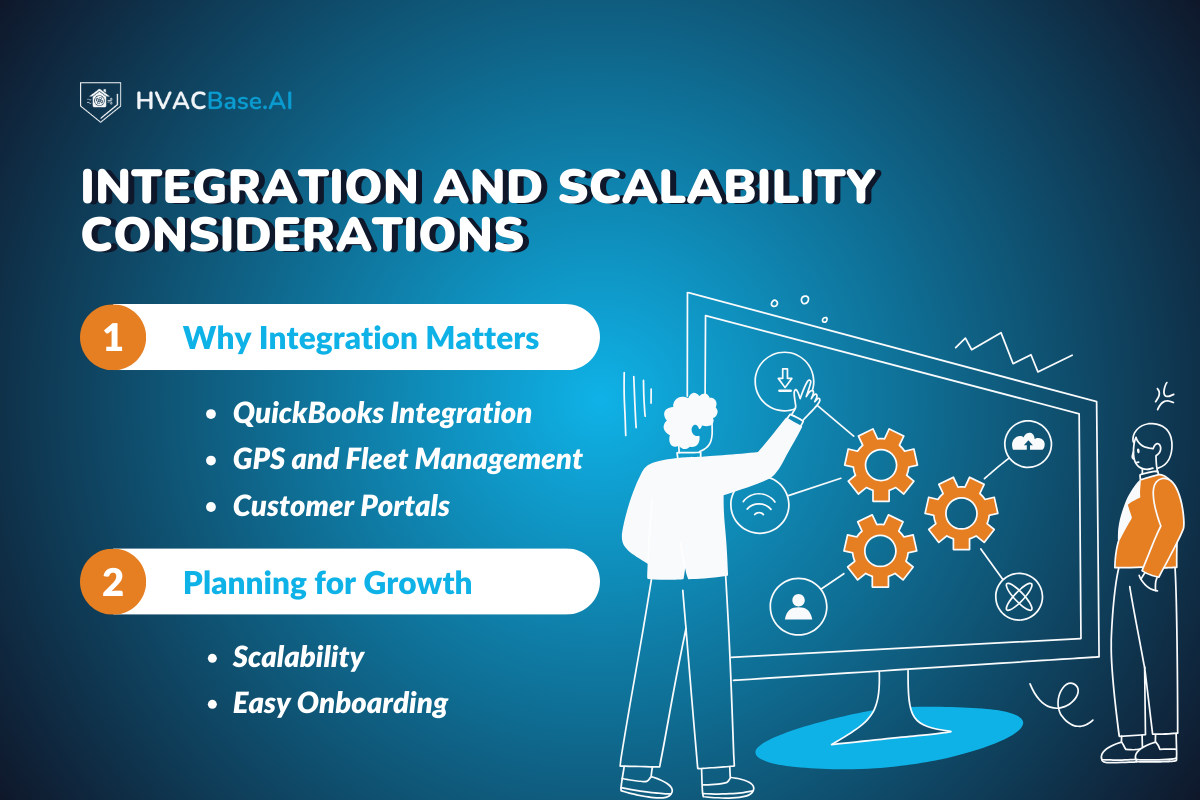
No tool is an island! Before committing to the best HVAC software for your business, ensure it integrates seamlessly with the rest of your systems.
Why Integration Matters
- QuickBooks Integration: Saves hours on accounting by linking invoicing, expense tracking, and payment processing to your accounting software.
- GPS and Fleet Management: GPS tracking integrated with dispatch and routing reduces fuel costs and keeps your vehicles where you need them.
- Customer Portals: Self-service options enable clients to check job progress, pay invoices, and request additional services with ease.
Planning for Growth
- Scalability: The right HVAC management software should scale with your team, supporting an increasing number of users, jobs, and locations seamlessly.
- Easy Onboarding: Look for exceptional training and support resources, especially if your crew includes folks who aren’t tech wizards.
- By 2025, large enterprises are expected to capture 62.8% of the HVAC software market, underscoring the demand for advanced, scalable solutions.
How to Choose the Right HVAC Software for Your Business
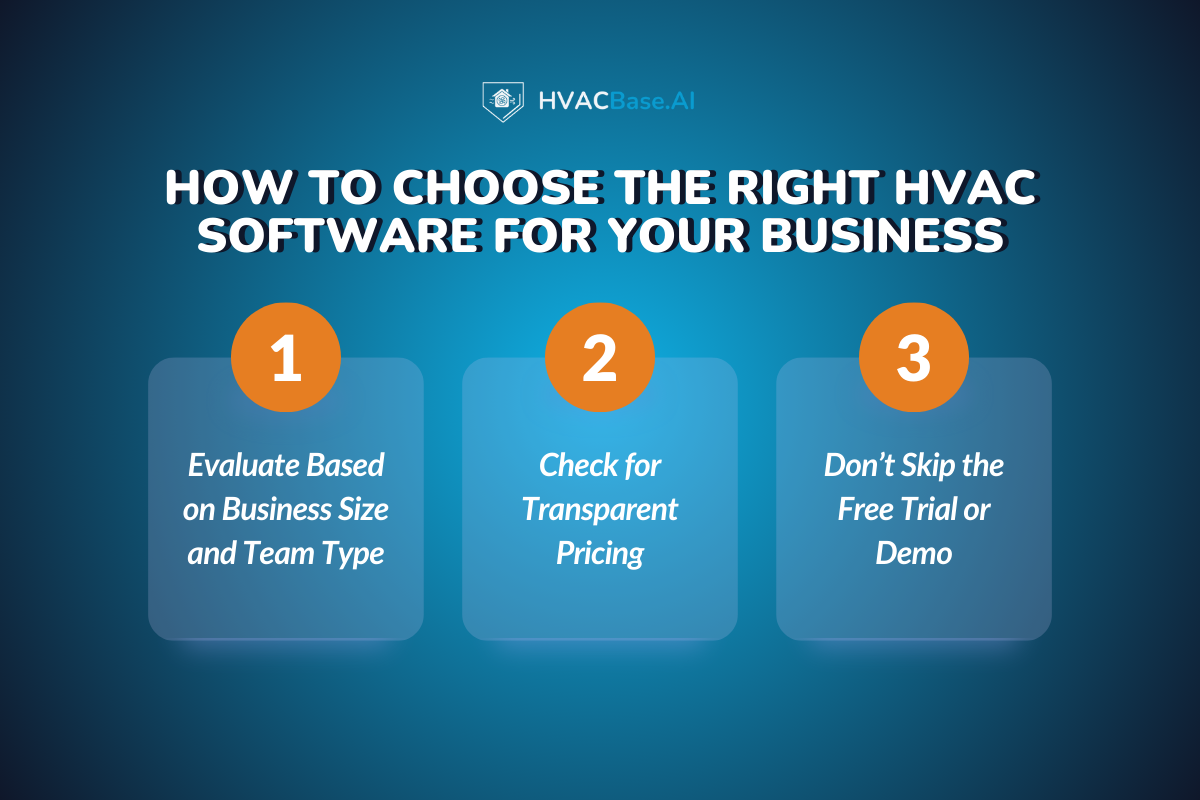
You know what to look for, but how do you actually choose when there are so many HVAC software solutions out there? Let’s break it down.
Evaluate Based on Business Size and Team Type
- Solo Techs: Might need lightweight tools for customer management, HVAC invoicing, and estimating, something quick to learn and easy to carry between jobs.
- Multi-Crew or Multiple Locations: Look for more advanced scheduling, field service management software, powerful reporting, and seamless communication between office and field teams.
- Commercial vs. Residential: Commercial HVAC companies often need robust project management, accounting software, compliance features, and customer management tools built for repeat jobs and long-term contracts. Residential HVAC businesses often focus on providing fast dispatch and easy-to-prepare quotes for homeowners.
Check for Transparent Pricing
Nobody likes surprise fees. So, ask this set of questions:
- Are there setup fees or extra costs for adding users?
- Does the mobile app come standard, or is it a paid add-on?
- Are invoicing, scheduling, and reporting all included, or do you have to buy modules separately?
Note: Get complete transparency before signing up.
Don’t Skip the Free Trial or Demo
Most HVAC software companies offer a demo or trial period, usually 7 to 14 days. Use this chance to put the software through its paces:
- Test scheduling a real job, assigning a tech, adding customer information, and sending an invoice.
- Use the mobile app, even when offline and in the field.
- Invite team members to give feedback; their buy-in is essential for success.
Think HVAC Software Is Complicated? HVACBase Makes It Easy
If the idea of changing your HVAC management software makes you break out in a sweat, you’re not alone. Solutions like HVACBase are designed to be user-friendly, especially for businesses that want to get started fast without a steep learning curve.
Picture this: Your team uses advanced scheduling tools to avoid double bookings, easily tracks inventory at every job site, and sends out quotes and invoices on the go from the HVAC mobile app.
Managers gain instant access to business performance dashboards and can view job progress in real-time. Plus, you’re always compliant with the latest safety rules, thanks to built-in regulatory checklists.
Even if you’ve never used field service management software before, a free demo shows exactly how these features work in real-world situations.
Onboarding is straightforward, support is responsive, and the platform scales with your company's growth.
For detailed information on HVAC software, go through: A Complete Guide to HVAC Project Management Software for 2025
Conclusion
There’s a reason so many HVAC companies are switching to dedicated HVAC business software. It’s not about keeping up now but getting ahead.
These seven must-have features are both “nice to have” and also set the foundation for smooth business operations, happy customers, and long-term growth.
The right software is your silent business partner. It keeps everyone on the same page, reduces costly mistakes, pays you faster, and frees up your time so you can focus on serving more customers and growing your business.
Ready to Level Up Your HVAC Operations?
Supercharge your HVAC business experience with faster scheduling, fewer headaches, and happier customers.
Book your demo with HVACBase today and discover effortless growth in just one click!
FAQs
1. What are the top features of HVAC business software?
Look for intelligent scheduling, mobile access, CRM, invoicing, inventory tracking, analytics, and compliance tools.
2. How does HVAC software help technicians and customers?
It improves scheduling, reduces paperwork, and gives real-time job updates for better service and satisfaction.
3. Is HVAC software worth it for small businesses?
Yes, scalable HVAC software saves time, reduces costs, and simplifies daily tasks, even for small teams.
4. Why integrate HVAC software with accounting and GPS tools?
Integrations automate data entry, enhance route planning, and streamline billing and operations, making them faster and more accurate.
Have questions or need personalized advice?
Talk to an Expert Today and let our construction specialists guide you to success.





